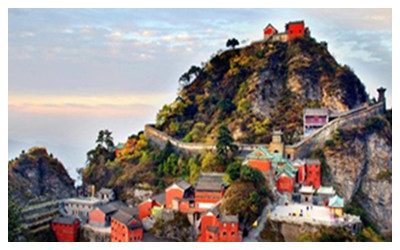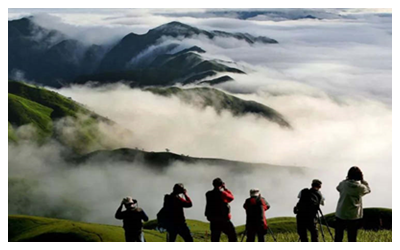Wugong Mountain is located at the intersection of Pingxiang, Ji'an and Yichun in Jiangxi Province. This mountain is one of China’s three great mountains to the south of the Yangtze River, together with Mt. Lushan in Jiangxi and Mt. Hengshan in Hunan.
What to see?
Wugong Mountain is most famous for its stretching and undulating meadow. The blue sky and endless meadow add radiance and beauty to each other, attracting innumerable outdoor fans to hike and camp here. Colorful tents dot the green grassland, constituting unique scenery. Plenty of rivers, brooks and waterfalls lay on Wugong Mountain. Cloud and mist often linger on the mountain, making it a wonderful place to enjoy the sight of the cloud sea. Throughout history, many poets and literati came here and left much beautiful poetry to eulogize the scenery of Wugong Mountain.
Golden Summit Scenic Spot

The Golden Summit
is the most popular scenic area on the mountain. It is also called
Baihe Peak, and is the apex of Wugong Mountain. It is located on the Pingxiang side of the mountain, with an elevation of about 2,000 m (6,000 ft). The Golden Summit is the highest peak in Jiangxi. Following are some famous spots in this area.
Stone Drum Temple (Shigu Temple): This temple has a history of more than 700 years, located at the foot of the Golden Summit. Originally it was called the Buddha Temple. According to legend, once upon a time Qianlong, an ancient Chinese emperor, came here and heard the sweet sound of streams. He followed the sound and found a stream striking a drum-shaped stone. He struck the stone with a crabstick and an earsplitting tum burst out. The emperor was so happy that he renamed the temple to “Shigu Temple”, which means “stone drum temple” in Chinese.
Ziji Palace: Ziji Palace is halfway up to the Golden Summit. It is also called Zhong’an, meaning “Middle Way Temple”. It is one of the three great temples (together with Stone Drum Temple on the foot and
Baihe Taoist Temple on the summit). The original temple was built in 1339 but has been ruined. The existing one was rebuilt in 2005. The temple covers an area of 1,200 sq m (1,435 sq yd) and enshrines one Buddhist immortal and two Taoist immortals. The harmonious coexistence of two religions shows the tolerance of Wugong Mountain.
Ancient Altars: The ancient altars are the “living fossils” of a sacrificial culture to the south of the Yangtze River. There are four stone altars with different orientations and architectural styles on the summit. The altars are more than 1,799 years old from their initial establishment. Ancient people believed that they could communicate with God by the altars, and worship of God would bring power to fight against natural disasters.
Spray of Waterfall out of a Golden Pot: This is the steepest waterfall on Wugong Mountain with a fall of 120 m (400 ft). The galloping waterfall strikes the stones and becomes misty fog, making the place look like a fairyland. It is on the middle mountain on the Pingxiang side.
Fanyunjie Scenic Spot

Fayunjie is located in the middle of Wugong Mountain on the Ji’an side, with an elevation of 1,600 m (5,300 ft). This area is the best place to watch the sea of clouds on Wugong Mountain. When it is going to rain, the sea of clouds tumble in the sky, forming spectacular scenery. Fayunjie is also famous for a large area of meadow. It is called “one of the three most beautiful alpine meadows in
China”, and is a wonderful place to hike and camp.
A sea of clouds, looking like a waterfall from heaven, is seen at Wugong Mountain in Jiangxi province. With the May Day holiday approaching, it is expected tourists from across the county will visit the mountain. [Photo by Wu Gongshan/provided to chinadaily.com.cn]
Travel Tips
Add: located at the intersection of Pingxiang, Ji'an and Yichun in Jiangxi Province.
Entrance Fees: CNY 70, including the shuttle bus fare from the tourist center to Stone Drum Temple.
Ropeway Ticket Price:
Zhong'an Ropeway between mountain foot and middle mountain: CNY 65 for upward ride; CNY 50 for downward ride.
Golden Summit Ropeway between middle mountain and the top: CNY 35 for upward ride; CNY 25 for downward ride
Opening Hours: 08:00-17:00
 The Golden Summit is the most popular scenic area on the mountain. It is also called Baihe Peak, and is the apex of Wugong Mountain. It is located on the Pingxiang side of the mountain, with an elevation of about 2,000 m (6,000 ft). The Golden Summit is the highest peak in Jiangxi. Following are some famous spots in this area.
The Golden Summit is the most popular scenic area on the mountain. It is also called Baihe Peak, and is the apex of Wugong Mountain. It is located on the Pingxiang side of the mountain, with an elevation of about 2,000 m (6,000 ft). The Golden Summit is the highest peak in Jiangxi. Following are some famous spots in this area. Fayunjie is located in the middle of Wugong Mountain on the Ji’an side, with an elevation of 1,600 m (5,300 ft). This area is the best place to watch the sea of clouds on Wugong Mountain. When it is going to rain, the sea of clouds tumble in the sky, forming spectacular scenery. Fayunjie is also famous for a large area of meadow. It is called “one of the three most beautiful alpine meadows in China”, and is a wonderful place to hike and camp.
Fayunjie is located in the middle of Wugong Mountain on the Ji’an side, with an elevation of 1,600 m (5,300 ft). This area is the best place to watch the sea of clouds on Wugong Mountain. When it is going to rain, the sea of clouds tumble in the sky, forming spectacular scenery. Fayunjie is also famous for a large area of meadow. It is called “one of the three most beautiful alpine meadows in China”, and is a wonderful place to hike and camp. Ask Questions ?
Ask Questions ?